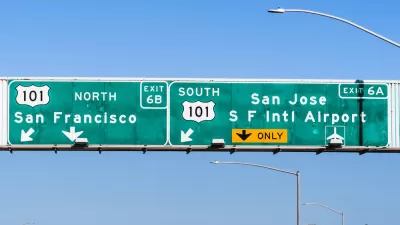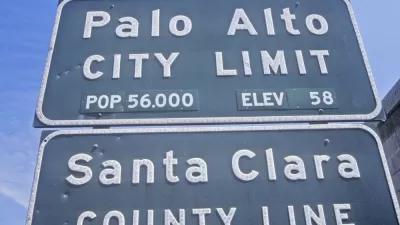In some places, it might be hard to imagine even considering a cap on the development of commercial development. Palo Alto, home to Stanford University and a hot bed of California's tech industry, did just that in City Council earlier this week.
"Palo Alto's polarizing debate over office growth hit a stalemate Monday night when a deeply divided City Council agonized over the topic for more than four hours before deciding not to move ahead with any dramatic development restrictions just yet," reports Gennady Sheynar.
The proposal would cap commercial development in the city at an annual limit of 35,000 to 50,000 square feet of new office space every year. The motivation behind the law, naturally, concerns parking and traffic. The cap would be added to an update of the city's Comprehensive Plan.
Opponents of the plan, which include several councilmembers and the city's Chamber of Commerce, "urged the council not to move ahead with a building restriction, which they argued would threaten downtown's vitality without achieving anything useful," according to Sheynar.
"[Palo Alto City Councilmember Marc] Berman ticked off a list of initiatives that the city is already pursuing to address these issues, which include a new downtown Residential Parking Permit Program that would restrict the amount of time employees can park in residential areas; a new Transportation Management Association that would offer businesses incentives to switch from cars to other modes of transportation; and an expansion of the city's shuttle system."
The Peninsula Transportation Alternatives blog and Nathan Donato-Weinstein also provided coverage of the proposal in the days leading up to Monday's hearing.
FULL STORY: Palo Alto divided over proposed office cap

Planetizen Federal Action Tracker
A weekly monitor of how Trump’s orders and actions are impacting planners and planning in America.

Maui's Vacation Rental Debate Turns Ugly
Verbal attacks, misinformation campaigns and fistfights plague a high-stakes debate to convert thousands of vacation rentals into long-term housing.

San Francisco Suspends Traffic Calming Amidst Record Deaths
Citing “a challenging fiscal landscape,” the city will cease the program on the heels of 42 traffic deaths, including 24 pedestrians.

Amtrak Rolls Out New Orleans to Alabama “Mardi Gras” Train
The new service will operate morning and evening departures between Mobile and New Orleans.

The Subversive Car-Free Guide to Trump's Great American Road Trip
Car-free ways to access Chicagoland’s best tourist attractions.

San Antonio and Austin are Fusing Into one Massive Megaregion
The region spanning the two central Texas cities is growing fast, posing challenges for local infrastructure and water supplies.
Urban Design for Planners 1: Software Tools
This six-course series explores essential urban design concepts using open source software and equips planners with the tools they need to participate fully in the urban design process.
Planning for Universal Design
Learn the tools for implementing Universal Design in planning regulations.
Heyer Gruel & Associates PA
JM Goldson LLC
Custer County Colorado
City of Camden Redevelopment Agency
City of Astoria
Transportation Research & Education Center (TREC) at Portland State University
Jefferson Parish Government
Camden Redevelopment Agency
City of Claremont




























